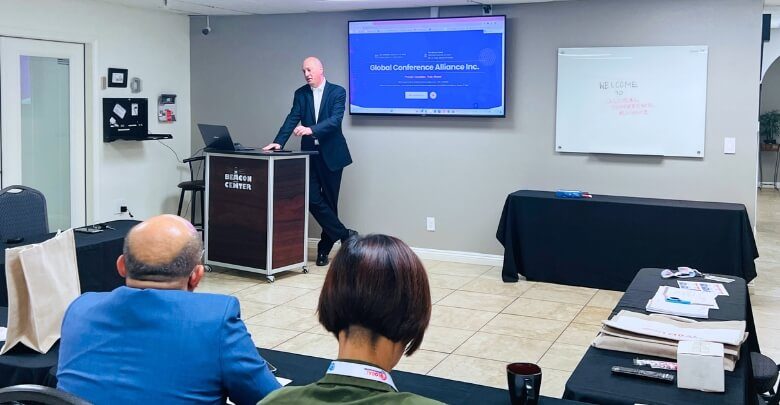Attending conferences is a valuable opportunity for professional growth, networking, and staying updated with the latest industry trends. But have you ever wondered “How to get invited to conferences?” If you’re eager to learn the secrets of getting invited to conferences, you’ve come to the right place.
To increase your chances of getting invited to conferences, establish yourself as an expert in your field through publications and active participation in professional networks. Maintain an updated professional profile and express your interest in speaking engagements with conference organizers.
In this blog, we will explore strategies, tips, and techniques that can help you increase your chances of receiving coveted conference invitations. From building a strong professional network to showcasing your expertise, we’ll delve into various approaches that can elevate your profile and attract conference organizers’ attention.
So, let’s dive in and discover the secrets to securing coveted conference invitations.
Understanding The Value Of Conferences
Conferences offer immense value by providing opportunities for networking, career advancement, professional development, and knowledge sharing. Understanding the significance of conferences allows individuals to maximize their participation and harness these events’ benefits.
Networking Opportunities
Conferences offer a valuable platform for networking with professionals, experts, and potential collaborators. They bring together diverse individuals, creating chances to exchange ideas, build connections, and establish relationships. Engaging in conversations, attending networking sessions, and participating in international business events can open doors to partnerships and job opportunities.
Career Advancement
Conferences contribute to career growth by showcasing expertise, presenting research, and gaining recognition. Presenting as a speaker or panelist enhances professional reputation, and conferences attract industry leaders and recruiters, offering career opportunities. Sharing insights and demonstrating expertise can leave a lasting impression on potential employers.
Professional Development
Conferences provide workshops, seminars, and speeches by experts, facilitating skill acquisition and knowledge expansion. Learning from peers and experts broadens perspectives and inspires innovative thinking.
Knowledge Sharing And Gaining Insights
Conferences serve as a hub for knowledge exchange through presentations, discussions, and poster sessions. Attendees stay updated on research, emerging trends, and best practices. Engaging with fellow attendees stimulates intellectual growth and encourages interdisciplinary collaborations, contributing to field advancement.
How To Get Invited To Conferences?
Understanding the value of conferences is crucial. They’re platforms for networking, career advancement, and professional development, offering opportunities to gain new insights and share knowledge. Attending such events propel your career in unexpected ways.

Identify Your Field Of Interest
Choose the right conferences for your professional or academic goals. Look for events in your field that align with your interests and professional aspirations. Attending the right conference enhances your chances of making valuable connections and learning pertinent information.
Enhance Your Professional Image
Crafting a compelling professional profile significantly improves your chances of conference invites. Ensure your online presence showcases your achievements, skills, and areas of expertise. Keep your CV or resume updated, consistently emphasizing your unique brand across all platforms.
Expand Your Network
Strong networks often open doors to conference invitations. Broaden your circle by joining professional associations, participating in online forums, and attending local events. These activities will help you meet people who potentially invite you to relevant conferences. Once you get an invitation, you’ll need to just accept the conference invitation, which is just quite easy to do.
Stay Active In Your Field
Engagement in your field signals to others that you’re an active participant in your community. This involves publishing research papers, speaking at local meetups, or engaging in professional discussions. Your activity draws the attention of conference organizers. This will help you to get invitations from different conferences, even as a speaker for the conference.
Seek Speaking Opportunities
Often, conference speakers receive invitations to other events. Start by seeking speaking opportunities at smaller conferences or meetups, gradually working your way up. Ensure your proposal highlights your unique perspective and the value you can bring to the audience.
Construct Impressive Conference Proposals
Writing a compelling conference proposal is an art. It requires conveying your ideas clearly and effectively and demonstrating the value you can add to the conference. Research the conference theme, understand the audience, and craft a proposal that aligns with these elements.
Nurture Your Connections
After attending a conference, ensure you maintain the relationships you’ve developed. Regular follow-ups with the organizers and attendees result in future conference invitations. Use these opportunities to show gratitude, share insights, and express interest in future events.
Stay Patient And Consistent
Receiving conference invitations doesn’t happen overnight. Consistency, patience, and a positive attitude are key. Keep refining your approach, learning from every event you attend, and persistently contributing to your field.
Way To Decline An Invitation Professionally And Respectfully
When declining an invitation, handling the situation tactfully and professionally is important. Considering the following tips, you can easily navigate this delicate situation and maintain positive relationships.
Reasons For Declining
There can be various reasons for declining an invitation to a conference. One common reason is scheduling conflicts, where the conference dates clash with prior commitments or important events. Another reason could be a lack of relevance or alignment with your current professional goals or research interests.
Limited funds or resources to attend the conference also be a factor. Personal or family obligations, health issues, or travel restrictions can also lead to declining an invitation.
Tips For Declining Professionally
When declining an invitation to a conference, it’s important to do so professionally and courteously. Firstly, express your gratitude for the invitation and acknowledge the value of the conference. Clearly state the reason for declining without providing excessive details.
Be concise and respectful in your response. Suggest alternatives, such as remote participation or offering to contribute in another capacity. Keep the lines of communication open and maintain a positive tone in your message.
Remember to respond on time to allow the conference organizers to make necessary arrangements. By declining invitations professionally, you maintain professional relationships and leave the possibility open for future engagements.
How Can You Effectively Reply To A Conference Invitation?
When replying to a conference invitation, composing a thoughtful and professional response acknowledging the sender is crucial. Begin by expressing gratitude for the invitation and showing appreciation for being considered as a participant. Clearly state whether you will attend the conference or politely decline if you cannot participate due to prior commitments or other reasons.
In your response, ensure that you provide any necessary information or seek clarification on specific details such as presentation requirements, session format, or any additional responsibilities. This demonstrates your commitment to preparing appropriately and aligning with the conference objectives.
If there are logistical or scheduling concerns, kindly address them concisely and courteously, allowing the conference organizer to make necessary arrangements or provide alternatives if possible.
Maintaining open communication throughout the process is essential. Respond promptly to the invitation, respecting any deadlines specified by the organizer. Be professional in your tone, proofread your response for clarity and accuracy, and consider following up with a thank-you note after sending your reply.
You contribute to a positive and efficient conference experience for yourself and the organizers by demonstrating professionalism, responsiveness, and gratitude.
Securing Speaking Opportunity At A Conference
Speaking at a conference is a valuable opportunity to share your expertise, showcase your knowledge, and engage with a larger audience. If you have been invited or are considering applying to speak at a conference, navigating the process effectively is important.
Navigating The Speaker Selection Process:
Navigating the speaker selection process requires proactive engagement. Research conferences aligned with your expertise. Stay updated with relevant publications and social media. Submit a compelling proposal highlighting your topic’s relevance and your unique perspective. Engage with conference organizers and professional networks to enhance visibility.
Preparing For The Speaking Engagement
Thorough preparation is crucial for a successful speaking engagement. Understand the conference theme and target audience. Tailor your presentation accordingly. Conduct research, gather relevant data, and organize your content logically. Practice your delivery. Consider visual aids or multimedia. Prepare for potential questions. Adhere to time constraints for a concise and impactful presentation.
How To Identify Scams Related To Conference Invitations?
Regarding conference invitations, be cautious and vigilant to protect yourself from scams. By being aware of the red flags and taking necessary precautions, you can avoid falling victim to fraudulent schemes. Let’s explore some key strategies to protect yourself and verify the legitimacy of conference invitations.
Identifying Red Flags In Conference Invitations:
To protect yourself from scams related to conference invitations, you’ll need to be vigilant and identify red flags that may indicate fraudulent or illegitimate invitations. Some common red flags to watch out for include:
- Unsolicited Invitations: Be cautious of conference invitations that come out of the blue without any prior communication or connection with the sender.
- Poorly Written Or Unprofessional Emails: Pay attention to the language, grammar, and formatting of the invitation. Legitimate conference invitations are usually well-written and professional.
- Requests For Personal Information Or Payment: Legitimate conference invitations should not ask for sensitive personal information or immediate payment without providing correct details about the conference.
- Lack Of Verifiable Information: Check if the conference organizers provide verifiable information, such as a website, contact details, or links to previous conferences they have organized.
Verifying The Legitimacy Of Conferences:
It is important to conduct research and due diligence to verify the legitimacy of a conference invitation. Here are some steps you can take:
- Check The Conference Website: Visit the conference website and carefully review the information provided. Legitimate conferences usually have well-designed websites with detailed information about the event, including the organizers, program, speakers, and registration process.
- Search For Reviews Or Feedback: Look for reviews or feedback from previous conference attendees. This can provide insights into the credibility and quality of the conference.
- Contact The Organizers: Reach out to the conference organizers directly through the contact information provided on their website. Ask specific questions about the conference and assess their responsiveness and professionalism in their communication.
- Verify The Venue And Dates: Cross-check the conference venue and dates with reputable sources, such as official event listings or trusted conference directories.
- Seek Recommendations Or Advice: Consult with colleagues, industry professionals, or trusted networks for their opinions or recommendations on the conference.
Conclusion
Getting invited to conferences is a valuable opportunity for professional growth, networking, and knowledge exchange. By implementing strategic approaches, individuals increase their chances of receiving conference invitations.
Building a strong professional network, establishing a reputable online presence, actively contributing to the field through research and publications, and staying updated with industry trends is key to enhancing visibility and attracting invitations.
Additionally, engaging in collaborations, participating in relevant events, and showcasing expertise help individuals gain recognition and credibility, making them more likely to be invited to conferences. Remember, receiving conference invitations requires dedication, consistency, and active involvement in your field.
So, how to get invited to conferences? Investing in your professional development, building meaningful connections, and consistently showcasing your expertise can enhance your chances of receiving those coveted conference invitations.







